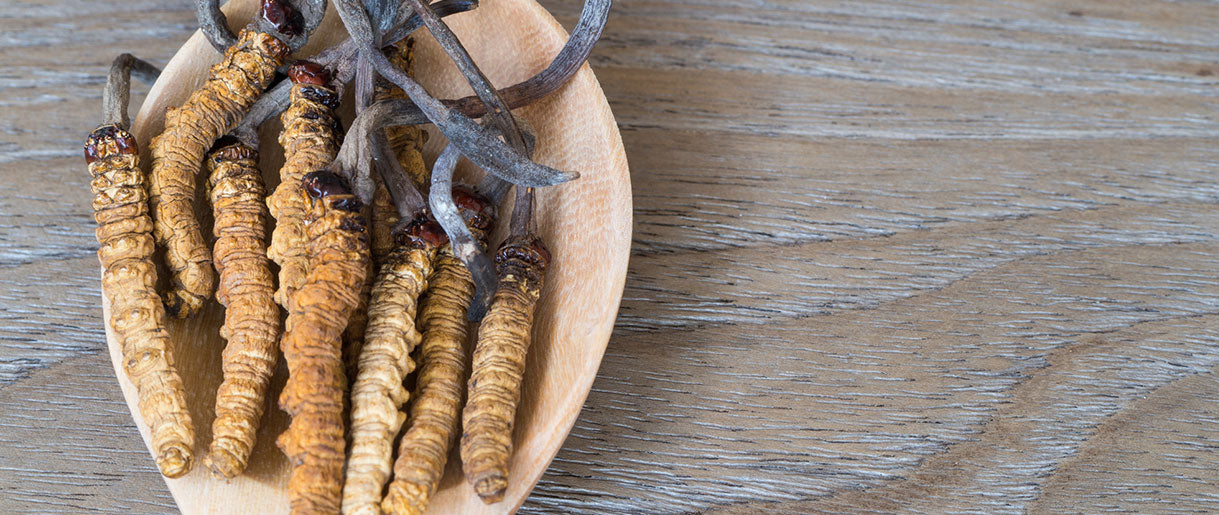Cordyceps, a fungus traditionally used in Eastern medicine, has been associated with several potential health benefits, including improved lung health.
Scientific research indicates that cordyceps may enhance respiratory function by increasing oxygen utilization, reducing symptoms of respiratory conditions, and strengthening the immune response against respiratory infections. These potential benefits may help those with chronic lung diseases like asthma and chronic obstructive pulmonary disease (COPD).
This article will explore the fascinating world of cordyceps and their potential benefits for lung health. We will delve into the history of this unique fungus, its traditional use in Eastern medicine, and the scientific studies that have examined its potential impact on respiratory health. We aim to provide an in-depth understanding of how cordyceps might contribute to lung health and how they can be safely incorporated into your wellness routine.
The Rich History of Cordyceps: A Journey from Traditional to Modern Therapies

The Traditional Roots: Cordyceps in Eastern Medicine
For thousands of years, Cordyceps Sinensis has been used in traditional Chinese medicine for its wide-ranging therapeutic properties. According to ancient texts, Cordyceps Sinensis balanced the body's vital energies, known as Qi, promoting overall health and longevity.
The unique features and perceived benefits of C. Sinensis made it an essential part of traditional Chinese medicine, which emphasizes the harmony between the human body and its natural environment. Within this framework, Cordyceps Sinensis was considered a potent remedy to restore vitality, boost immunity, and improve respiratory health, which explains its modern-day popularity as a supplement for lung health.
The Discovery and Journey of Cordyceps Sinensis to Mainstream Use
The journey of C. Sinensis from a niche traditional Chinese medicine to a globally recognized health supplement is fascinating. Cordyceps were first discovered in the mountainous regions of China, where they were found infecting caterpillars. These infected caterpillars would transform into the unique, fruiting bodies of the Cordyceps Sinensis fungus, a process that intrigued local practitioners and led to its inclusion in their medicinal repertoire.
Over time, the benefits of Cordyceps Sinensis started gaining recognition beyond traditional Chinese medicine. With the advent of modern science and medicinal research, the focus shifted toward understanding the therapeutic potential of this unusual fungus.
Today, experimental and therapeutic medicine explores the potential applications of Cordyceps Sinensis, including its influence on respiratory health. With a growing body of research supporting its traditional uses, Cordyceps Sinensis has successfully transitioned from the annals of traditional Chinese medicine to the shelves of health stores worldwide.
Understanding Cordyceps: A Deep Dive into Its Unique Life Cycle and Varieties

The Bizarre Biology: Cordyceps' Unique Life Cycle
One of the most fascinating aspects of cordyceps is their unique life cycle. In their natural environment, cordyceps spores infect various insects and arthropods. Once infected, the spores germinate and gradually take over the host, replacing its tissue with its mycelium.
Eventually, the cordyceps fruiting body emerges from the deceased host, ready to release spores and repeat the cycle. This peculiar biological process has attracted scientists' attention, sparking numerous studies to understand its complex nature.
Exploring the Two Main Varieties: Cordyceps Sinensis and Cordyceps Militaris
When discussing cordyceps, two main varieties are often in focus: Cordyceps Sinensis and Cordyceps Militaris.
Cordyceps Sinensis, also known as caterpillar fungus, originates from the high-altitude regions of China, Nepal, and Tibet. In nature, it primarily parasitizes the larvae of ghost moths, hence the nickname. Given its rarity and high demand, the price for wild Cordyceps Sinensis has skyrocketed, leading to the development of cultured Cordyceps Sinensis, which is more accessible and affordable.
On the other hand, Cordyceps Militaris is another well-known variety, recognized for its vibrant orange fruiting bodies. Unlike C. Sinensis, Cordyceps Militaris is relatively easy to cultivate, making it a more sustainable and widely available choice.
Both varieties have been extensively studied for their potential health benefits. Interestingly, research suggests that cordyceps extract from both C. Sinensis and C. Militaris contains bioactive components with similar health-promoting properties, although the concentrations of these compounds can vary.
The Power of Cordyceps Extract
Cordyceps extract, derived from either C. Sinensis or C. Militaris, has become popular in supplement form due to its concentration of beneficial compounds. Whether it's cordyceps extract used in traditional remedies or contemporary supplements, its potential benefits make cordyceps a topic of ongoing research and interest in wellness circles.
Unveiling the Science: The Impact of Cordyceps on Lung Health

Research on Cordyceps and Respiratory Function: An In-Depth Review
Research into the effects of cordyceps on lung health has provided some intriguing insights. One study demonstrated that(1) cordyceps might help enhance lung function by increasing oxygen utilization and thus improving the body's respiratory capacity. This suggests potential benefits for people with chronic obstructive lung disease and other respiratory conditions.
Another study(2) using human bronchial epithelial cells showed that cordyceps extract could protect against damage caused by reactive oxygen species. These harmful molecules can damage cells and contribute to respiratory disease progression.
Potential Benefits and Limitations of the Research
Although the research shows promise, it's essential to acknowledge its limitations. Most studies on cordyceps and lung function have been conducted in laboratories or on animals, meaning the results might not fully translate to humans.
Additionally, while the research suggests cordyceps may play a role in inhibiting oxidative stress, reducing inflammatory cytokines, and even combating mitochondrial dysfunction in lung epithelial cells, more large-scale human trials are needed to confirm these effects.
However, the potential benefits of cordyceps for lung health are compelling. They may help mitigate the infiltration of inflammatory cells into the lungs, reducing inflammation and potentially improving lung function.
Case Studies Highlighting Cordyceps' Potential Benefits for Lung Health
Case studies add a layer of real-world evidence to the scientific research. For instance, several anecdotal reports suggest improvements in symptoms and lung function in individuals with various lung conditions following the regular intake of cordyceps. While these case studies are encouraging, they should be interpreted cautiously as they do not have the same rigorous controls as formal scientific studies.
Delving Deeper: How Cordyceps May Benefit Lung Health

Potential Mechanism of Action: Unraveling the Science
The exact mechanisms through which cordyceps benefit lung health are still under investigation. However, current research indicates that(3) cordyceps might play a role in inhibiting inflammation and oxidative stress, two key factors implicated in many lung conditions.
In studies conducted on human lung epithelial cells, cordyceps extract has been shown to reduce the production of inflammatory molecules and reactive oxygen species. These are harmful substances that can damage lung tissues and exacerbate respiratory diseases. By mitigating these harmful processes, cordyceps may help protect the lungs and enhance their functioning.
Cordyceps for Lungs: A Potential Ally in Respiratory Health
In traditional Eastern medicine, cordyceps have long been used for their perceived ability to enhance lung efficiency and resistance to respiratory infections. Recent scientific research seems to support these traditional uses of cordyceps for lungs.
In conditions like chronic bronchitis and chronic obstructive pulmonary disease (COPD), where lung tissues are chronically inflamed and damaged, cordyceps' potential anti-inflammatory and antioxidant properties might offer some benefits. By potentially reducing inflammation and oxidative damage, cordyceps could help to alleviate symptoms and improve lung function in individuals with these chronic lung diseases.
Moreover, some research suggests that(4) cordyceps could enhance the body's oxygen utilization, improving lung efficiency. This may translate to better endurance and reduced fatigue, particularly for individuals suffering from chronic lung diseases with compromised oxygen delivery. Moreover, Cordyceps is often used pre-workout because it boosts oxygen utilization, enhancing performance.
However, while the potential of cordyceps for lungs is promising, it's important to remember that cordyceps are not a cure-all. They should be used as part of a comprehensive approach to lung health, which includes a healthy diet, regular exercise, and appropriate medical treatments for chronic conditions like chronic bronchitis and chronic obstructive pulmonary disease (COPD).
Beyond the Lungs: The Multifaceted Health Benefits of Cordyceps

While noted for their potential benefits to lung health, Cordyceps is believed to offer a range of other health benefits. These fungi have been used for centuries in traditional medicine systems, where they are valued for their ability to restore energy, promote longevity, and strengthen the body's defense mechanisms.
A Potent Energy Booster
Research suggests that cordyceps boost energy levels by improving the body's utilization of oxygen and enhancing energy production, potentially leading to improved athletic performance and reduced fatigue.
Unshakeable Immune Support
Cordyceps are also being studied for their potential immune-modulating effects. Some research indicates that(5) these fungi may stimulate the body's immune response. This could lead to a lower risk of infections and a better response to immune challenges.
Benefits for Your Heart Health
Moreover, cordyceps have shown promise in supporting cardiovascular health. They might help to regulate blood pressure levels and maintain heart health, which is integral to overall well-being.
Anti-Aging Effects
Some evidence suggests(6) that cordyceps could support healthy aging thanks to their potential antioxidant properties. By reducing oxidative stress, a key contributor to aging and disease, cordyceps might help to promote longevity and stave off age-related conditions.
Incorporating Cordyceps into Your Daily Routine: A Practical Guide

Cordyceps Supplements: An Overview
Cordyceps supplements come in various forms, including capsules, powders, and tinctures. These supplements can be a convenient way to experience the potential health benefits of cordyceps, including its potential to support lung health.
Many people opt for supplements because they are easy to incorporate into daily routines, whether taking a capsule with breakfast or stirring cordyceps mushroom powder into a morning smoothie.
Safe Consumption: Dosage, Potential Side Effects, and Precautions
Following the recommended Cordyceps mushroom dosage listed on product labels or as a healthcare professional advises is essential. Overdoing it can lead to potential side effects such as dry mouth, diarrhea, and nausea.
Certain individuals should exercise extra caution. Pregnant and breastfeeding women, individuals with autoimmune diseases, and those with bleeding or clotting disorders should consult a healthcare professional before incorporating cordyceps into their routine.
Recipes and Tips for Integrating Cordyceps into Your Diet
Cordyceps can be incorporated directly into meals for those who prefer a more natural approach. Cordyceps powder can be mixed into soups, stews, or teas. Here are a few simple ways to start:
Cordyceps Tea
Mix a teaspoon of cordyceps powder into hot water. If desired, sweeten with honey or stevia, and enjoy a healthy-boosting cup of medicinal mushroom tea.
Superfood Smoothie
Blend cordyceps powder into your favorite smoothie recipe. It pairs well with fruits like bananas and berries and can add a healthful boost to your morning or post-workout routine.
Protein-Packed Oatmeal
Stir a serving of cordyceps powder into a warm bowl of oatmeal. Top with chia seeds and a dollop of almond butter for a nutritious, protein-packed breakfast.
FAQs About Cordyceps for Lungs
What Are The Potential Side Effects Of Using Cordyceps For Lung Health?
While Cordyceps are generally considered safe for most people, they may cause some side effects, mainly when consumed in excess. Potential side effects can include:
- Gastrointestinal discomfort: Some individuals might experience digestive issues such as diarrhea, nausea, or abdominal bloating.
- Dry mouth: This is another commonly reported side effect of cordyceps consumption.
- Allergic reactions: As with any supplement, there's a chance of allergic reactions, though this is rare. Symptoms may include rashes, itching, swelling, severe dizziness, and trouble breathing.
If you are considering using cordyceps for lung health or any other purpose, it's always best to start with a small dose to see how your body reacts and consult a healthcare professional.
Can Cordyceps Supplements Interact With Other Medications Or Supplements?
Yes, cordyceps can potentially interact with certain medications and supplements. For example:
- Immune-Suppressing Medications: Since cordyceps might stimulate the immune system, it could potentially interfere with medications designed to suppress the immune system. These medications are often prescribed to people with autoimmune diseases or those who have undergone organ transplants.
- Blood Thinners: There's some evidence that cordyceps may slow blood clotting. Using cordyceps could increase your risk of bruising or bleeding if you're taking blood-thinning medications, such as warfarin.
- Insulin or other Diabetes Medications: Cordyceps may lower blood sugar levels, potentially enhancing the effects of insulin or other diabetes medications and increasing the risk of hypoglycemia (low blood sugar).
- Caffeine and other Stimulants: Cordyceps can potentially have a stimulant effect, which may amplify the effects of caffeine or other stimulant drugs.
- Hormonal Medications: There's some evidence that cordyceps might act like estrogen in the body, potentially interfering with hormone replacement therapies or hormonal contraceptives.
These are just a few examples, and this list isn't exhaustive. If you're considering taking cordyceps, it's essential to consult with a healthcare provider, particularly if you're already taking medication or other supplements. They can help assess your situation and guide you to minimize potential interactions and side effects.
How Long Does It Take To See the Benefits Of Taking Cordyceps For Lung Health?
The timeframe for experiencing benefits from taking cordyceps for lung health can vary significantly from person to person. It depends on numerous factors, including the individual's overall health, the severity of their lung condition, their lifestyle, and the dosage and quality of the cordyceps supplements they use.
Some individuals may notice minor improvements in energy levels and overall well-being within a few weeks of regular cordyceps consumption. It might take several months of consistent use for more specific benefits such as improved respiratory function or relief from symptoms of chronic lung conditions.
Key Takeaways
Cordyceps' potential benefits for lung health are attributed to their anti-inflammatory, antioxidant, and immunomodulatory properties. Scientific studies have shown promise in their use for managing chronic bronchitis and chronic obstructive pulmonary disease (COPD) by potentially enhancing lung function and reducing inflammation.
However, it's important to note that cordyceps are not a cure-all for lung conditions. While they may offer some benefits, they should be considered part of a comprehensive approach to lung health, which includes a healthy lifestyle, regular exercise, and appropriate medical treatment.
As we conclude our deep dive into cordyceps for lung health, we invite you to share your thoughts and experiences. Have you used cordyceps for lung health or other wellness goals? We'd love to hear from you. Please leave a comment below and join the conversation!
References
- Effectiveness and Safety of Oral Cordyceps sinensis on Stable COPD of GOLD Stages 2-3: Systematic Review and Meta-Analysis, (1)https://pubmed.ncbi.nlm.nih.gov/31073318/
- Protective effect of Cordyceps militaris against hydrogen peroxide-induced oxidative stress in vitro, (2)https://www.ncbi.nlm.nih.gov/pmc/articles/PMC6669067/
- Anti-inflammatory effects of Cordyceps mycelium (Paecilomyces hepiali, CBG-CS-2) in Raw264.7 murine macrophages, (3)https://www.ncbi.nlm.nih.gov/pmc/articles/PMC4371127/
- Chronic supplementation of a mushroom blend on oxygen kinetics, peak power, and time to exhaustion, (4)https://www.ncbi.nlm.nih.gov/pmc/articles/PMC4594151
- Trends in the Immunomodulatory Effects of Cordyceps militaris: Total Extracts, Polysaccharides and Cordycepin, (5)https://www.ncbi.nlm.nih.gov/pmc/articles/PMC7735063/
- Antiaging effect of Cordyceps sinensis extract, (6)https://pubmed.ncbi.nlm.nih.gov/18803231/









Let Us Know Your Comments